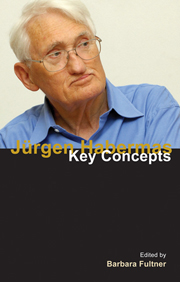Book contents
- Frontmatter
- Contents
- Contributors
- Acknowledgements
- Abbreviations
- Introduction
- 1 Historical and intellectual contexts
- PART I COMMUNICATIVE RATIONALITY
- PART II MORAL AND POLITICAL THEORY
- PART III POLITICS AND SOCIAL CHANGE
- 9 Civil society and social movements
- 10 Cosmopolitan democracy
- 11 Rationalization, modernity and secularization
- Chronology of life and works
- Bibliography
- Index
11 - Rationalization, modernity and secularization
from PART III - POLITICS AND SOCIAL CHANGE
- Frontmatter
- Contents
- Contributors
- Acknowledgements
- Abbreviations
- Introduction
- 1 Historical and intellectual contexts
- PART I COMMUNICATIVE RATIONALITY
- PART II MORAL AND POLITICAL THEORY
- PART III POLITICS AND SOCIAL CHANGE
- 9 Civil society and social movements
- 10 Cosmopolitan democracy
- 11 Rationalization, modernity and secularization
- Chronology of life and works
- Bibliography
- Index
Summary
The question of religion is at the centre of not just sociology and philosophy, but also political theory. With respect to sociology, it can be said that modern sociology emerged precisely through an attempt to make sense of how social order was forged from a religiously sanctioned social and political matrix, and how in turn religion itself had been sublimated and transcended through the development of profane structures of subjective, interpersonal and worldly interaction. At the heart of sociology is the notion that the modern social order emerged through the dual processes of privatization of religion and the disenchantment of a world that had been rendered profane and thus both knowable and manipulable by humans. For Émile Durkheim and Max Weber, social solidarity takes the place of religion, and an ethos of frugality and industry becomes a secular version of religious orientations and practices. For most social theorists after Marx, Durkheim and Weber, the modern social order is predicated on the secularization of both the social and natural worlds that entailed and anticipated the eventual withering of religion. With respect to philosophy, it can be said that there has been no philosopher who has not grappled with the question of the dependence of philosophy on religious notions. From Plato through Derrida, and of course up to Habermas, the question has been posed in terms of the possibility of a dialogue, or subterranean co-dependence, between Athens and Jerusalem, where each is a metonym for reason and faith respectively.
- Type
- Chapter
- Information
- Jürgen HabermasKey Concepts, pp. 222 - 238Publisher: Acumen PublishingPrint publication year: 2011
- 2
- Cited by

